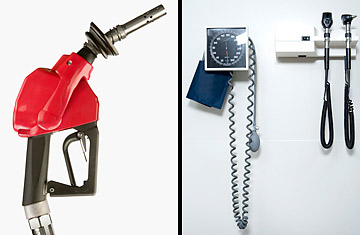
Our health-care crisis and our energy crisis are complex dilemmas made of many complex problems. But our biggest problem in both health care and energy is essentially the same simple problem: we use too much. And in both cases, there's a simple explanation for much of the problem: our providers get paid more when we use more.
Undoing these waste-promoting incentives — the "fee-for-service" payment system that awards more fees to doctors and hospitals for providing more services, and the regulated electricity rates that reward utilities for selling more power and building more plants — would not solve all our health-care and energy problems. But it would be a major step in the right direction. President Obama has pledged to pass massive overhauls of both sectors this year, but if Congress lacks the stomach for comprehensive reforms — and these days it's looking like Kate Moss in the stomach department — a more modest effort to realign perverse incentives could take a serious bite out of both crises.
Everyone knows we use too much energy. Our addiction to fossil fuels is torching the planet, empowering hostile petro-states and straining our wallets. Meanwhile, studies by scientists at the Lawrence Livermore National Laboratory and elsewhere suggest that more than half of our energy is lost through inefficiencies, calculations that don't even include the energy we fritter away through wasteful behavior like leaving lights on or idling cars. We're on course to increase electricity usage an extra 30% by 2030, which could require trillions of dollars' worth of new emissions-belching power plants, so it would be much better to eliminate the usage that doesn't add to our quality of life.
By contrast, not everyone realizes that we use too much health care; most of us assume that more treatment is better, that the best doctors are the ones who do the most to us, that our health costs are the world's highest because our health care is the world's most thorough. But a slew of research by the Dartmouth Institute for Health Policy and Clinical Practice has found that as much as 30% of our annual $2 trillion–plus medical bill may be wasted on unnecessary care, mostly run-of-the-mill diagnostic tests, office visits, hospital stays, minor procedures and prescriptions for brand-name wonder drugs advertised on TV. Our soaring health spending is on course to bankrupt the Treasury — along with state and local governments, big and small businesses, and millions of families — so again, it would be nice to cut out the usage that doesn't make us healthier and can even make us sicker.
Obama has already taken several whacks at waste in energy and health care. His stimulus had more than $20 billion for energy-efficiency measures designed to slash electricity use in low-income homes, on military bases and in all kinds of government buildings, while his fuel-efficiency standards for vehicles are expected to save billions of gallons of gasoline; he's also providing government financing for electric cars, and his cash-for-clunkers program is another assault on gas guzzlers. The stimulus also included $19 billion for computerizing the medical industry, which could reduce duplicative tests and office visits, plus $1.1 billion for "comparative effectiveness research" that could discourage ineffective treatments. And the President and the First Lady have used their bully pulpits — often backed by policy shifts — to discourage smoking while encouraging healthy eating and other wellness behaviors that reduce health-care consumption.
It makes good sense to give consumers of energy and health care information and incentives to deter us from overconsuming. But information has its limits. We all know exercise is good for us, but that doesn't get all of us off the La-Z-Boy. Incentives aren't everything either; wasting energy costs us money, but we do it all the time, and so do our factories and other ostensibly profit-maximizing businesses. Health care usually costs us money too, and even when co-payments are low, visiting the doctor is time-consuming and inconvenient, and staying in the hospital can be downright dangerous. Still, Dartmouth has documented enormous regional variations in medical care that produce virtually no variation in medical outcomes, a testament to our tolerance for overtreatment.
